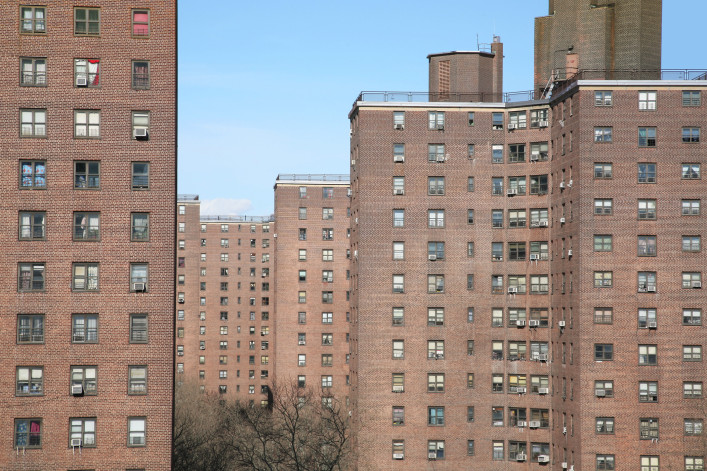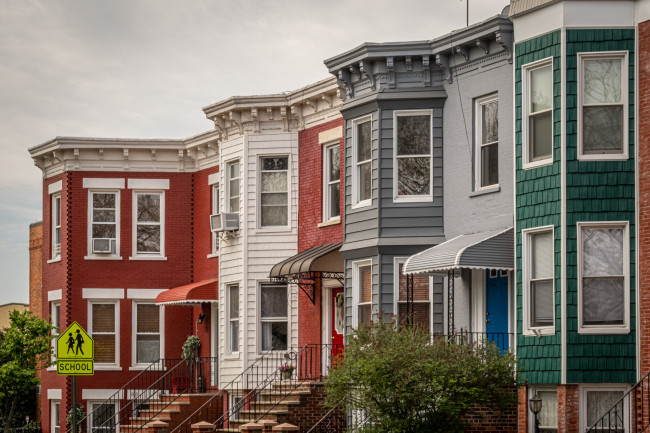NYC budget includes an extra $2 billion to build and preserve affordable housing
- The $112 billion budget includes funding for the construction of new, affordable apartments
- It also funds the CityFHEPS voucher program, NYCHA security guards, and a new estate planning program

New York City Housing Authority senior buildings will continue to have unarmed security guards thanks to the budget.
iStock
New York City’s $112 billion budget tackled a lot: It reversed millions in library funding cuts, restored funding to the city’s museums, and increased eligibility for discounted MetroCards. And it also made a multi-billion dollar investment in affordable housing.
The budget, adopted by the City Council on Sunday, allocated an extra $2 billion to the New York City Housing Authority and Housing Preservation & Development Department to create and preserve the city’s affordable housing stock.
“An additional two billion dollars isn’t an abstract number, it is a decisive and deliberate investment in confronting the housing crisis HPD works to tackle every day,” HPD Commissioner Adolfo Carrión Jr. said in a statement.
Around $700 million in funds will let NYCHA renovate the city’s public housing stock while roughly $792 million will go to the HPD for new multifamily housing construction. The rest is dedicated to the HPD for supportive housing construction, upgrades, and renovations, City & State reported.
The budget also expanded funding for CityFHEPS (one of the city’s housing voucher programs), will keep security guards at NYCHA buildings, and funds an estate planning program to help low and moderate income adults build generational wealth.
Read on for an overview of what the city budget has in store for housing.
Budget funds CityFHEPS vouchers to reduce homelessness
The adopted budget includes $614.9 million for CityFHEPS vouchers—a NYC benefit that covers some of a low-income tenant’s rent. Of that allocation, $540.3 million will become the baseline for CityFHEPS funding starting in the 2026 fiscal year
The new baseline for CityFHEPS means “we will not have to fight for this investment year after year,” Council Member Pierina Sanchez said in a statement.
It also provides significant funding to a program that usually runs over budget. For example, the city allocated $263 million in funding to CityFHEPS in the 2023 fiscal year, but ended up spending $499 million, according to a January Independent Budget Office report.
NYCHA security guards will keep patrolling under adopted budget
NYCHA’s senior buildings—those reserved for adults 62 years old or older—will continue to have unarmed security guards thanks to a $6.8 million budget allocation.
The Housing Authority had planned to cut the program at 55 buildings across the city to curb costs, as NYCHA faced a drop off in rent collections and a budget deficit, City Limits reported. The adopted budget reverses the planned cuts.
Budget provides $1 million for estate planning help
The budget included $1 million in for a new estate planning program to help low- and moderate-income adults protect their wealth.
The program, which will be administered by the HPD, will provide “legal and technical assistance” including estate planning workshops, help drafting wills, legal assistance, and counseling when property ownership may be unclear.
The new initiative could help NYC residents prevent losing their properties to con artists through deed theft. Perpetrators of deed theft often target older New Yorkers, those facing financial trouble, and residents of gentrifying neighborhoods.
New York state passed a law last year that halts evictions if there is an ongoing deed theft investigation, and those concerned about a scam can use the state’s Homeowner Protection Program to get free legal advice.




























